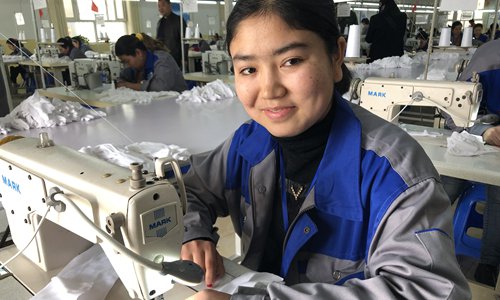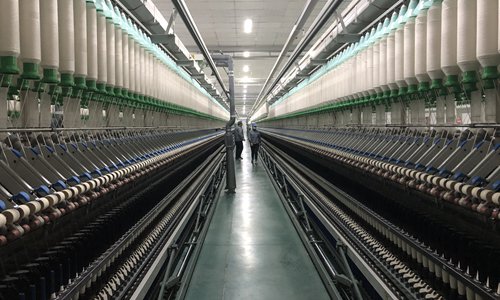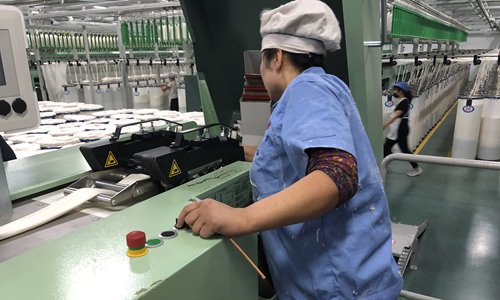HOME >> CHINA
Employees, experts refute US accusation over Xinjiang ‘forced labor’
By Liu Xin Source:Global Times Published: 2019/10/25 10:10:26

Ayixiamu Younusi works in an apparel factory in Shaya county in Aksu Prefecture. Photo: Liu Xin/GT
Mailkanmu Memet, a 43-year-old wife and mother, is content with her job which enables her to support her elderly mother and raise children. She works in an apparel factory at the Aksu Textile Industrial Park in Aksu Prefecture, Northwest China's Xinjiang Uyghur Autonomous Region.
A former housewife, Mailkanmu, and her family once depended solely on her husband's unstable income as a temporary construction worker.
"We have three kids to raise and need to take care of my 86-year-old mother" she told the Global Times.
Working at the factory since late 2018, Mailkanmu's monthly salary is about 3,000 yuan. Sometimes it's more as she is bonused based on work performance.
With her salary, "I could buy new clothes for myself and the children as I like," said Mailkanmu .
Mailkanmu said her family bought a new apartment near the industrial park with a 100,000 yuan bank loan.
Mailkanmu is one of thousands, especially from Xinjiang's rural regions, who have chosen to work in textile or apparel factories to bolster their family's income.

A production line in a yarn factory in Aksu Photo: Liu Xin/ GT
Xinjiang's developing textile and related industries, which fit with local conditions and customs, have benefited people like Mailkanmu as a result of a policy from China's central government and the Xinjiang regional government years ago.
However, it has come under fire from US media and institutions who have claimed that textile factory employees like Mailkanmu are "forced labor." Chinese experts refuted the accusations as "groundless" and purely "out of political purpose."
VOA Chinese released a report on Twitter on Thursday claiming that clothing made by "forced labor" in Xinjiang is likely being sold in the US. VOA Chinese cited a report from the Center for Strategic & International Studies (CSIS), released on October 16.
The report said Xinjiang "is in the process of significantly increasing textile and apparel manufacturing in the region through a mix of company subsidies and underpaid workers." The report also said that impoverished rural residents and trainees graduated from the vocational education and training centers in Xinjiang.
Without conducting surveys in Xinjiang or interviewing textile employees or local officials, the CSIS report is based on so-called anonymous sources from training centers in Xinjiang and one-sided reports from Western media, analysts said.
Groundless and political

An employee operates a machine in a yarn factory in Aksu Prefecture. Photo: Liu Xin/ GT
The report is "groundless" and "maliciously attacks China's poverty alleviation work in Xinjiang and smears local government efforts in promoting employment and improving social stability," Zhang Yonghe, executive dean of the Human Rights Institution of Southwest University of Political Science and Law in Chongqing, told the Global Times.
Zhang, who has conducted research in Xinjiang multiple times, said developing labor-intensive industries, including textile and yarn factories, helps Xinjiang's economic development and increases residential incomes.
"A job in a factory is welcomed especially by women in rural areas, as the income could not only help the family get out of poverty but also promote their statue in the family as well as in the society. Their spirits have greatly improved. How can you call these women 'forced labor?'" Zhang said.
Local governments offer many opportunities for the impoverished, and working in factories is only one of them. There is no such a thing as forcing them to work. Employees in factories usually receive basic wage and merit pay, which counts by pieces, Zhang said.
"I like the working atmosphere at my factory and will work as long as I can," Mailkanmu said.
The Global Times reporter visited shoemaking plants and apparel, yarn and textile factories in Aksu, Hotan, and Kashi and learned from employees their average monthly minimum wage was between 2,500 to 3,500 yuan plus performance bonuses.
Take Mailkanmu for example, her monthly salary is 2,500 to 3,500 yuan. According to a survey on job592.com, an employment and payroll survey website, the average 2019 pre-tax salary is around 2,931 yuan.
Responding to the CSIS report over claims that people from the training centers are forced labor for textile factories, Zhang said, "trainees who graduated from the training centers can choose whatever work they want."
"Some go back to their previous work, and some choose to use the vocational skills they have learned to make money, including entering apparel factories. They sign a service contract with factories and are paid the same as other employees," he said.
Early policy
Developing textile and relevant industries is the result of a policy from China's central government and the regional government of Xinjiang, and US media have hyped the topic, which exposes their intention of creating hurdles for China, experts said.
"Xinjiang has long been China's main cotton production area. It has an abundant labor force, relatively cheap land and electricity, and police support. The transportation has been greatly updated with close connectivity with other parts of China and Central Asia. Under the Belt and Road Initiative (BRI), Xinjiang is developing as a hub for textile industries," Tian Yun, director of the China Society of Macroeconomics Research Center, told the Global Times.
In early 2006, Xinjiang aimed to become the center for China's textile raw materials and products in five to 10 years. In 2012, Xinjiang released its 12th "Five-Year Plan" on the textile industry, vowing to become the most influential trade center and textile and clothing hub in China.
In 2015, Xinjiang invested 27.6 billion yuan in its textile industry and created 67,000 jobs in the first quarter of the year, tnc.com, global textile industry website, reported.
"Developing the textile industry, which does not cause too much pollution, is an effective way to help boost economic development in Xinjiang, a landlocked region, as well as benefitting local residents. Those who accuse Xinjiang of using 'forced labor' for development have ulterior motives," said Tian.
Both Zhang and Tian noted that by exaggerating Xinjiang's issues, the US wants to stand on a moral high ground to criticize or impose sanctions on China and disrupt its overall development.
Posted in: SOCIETY